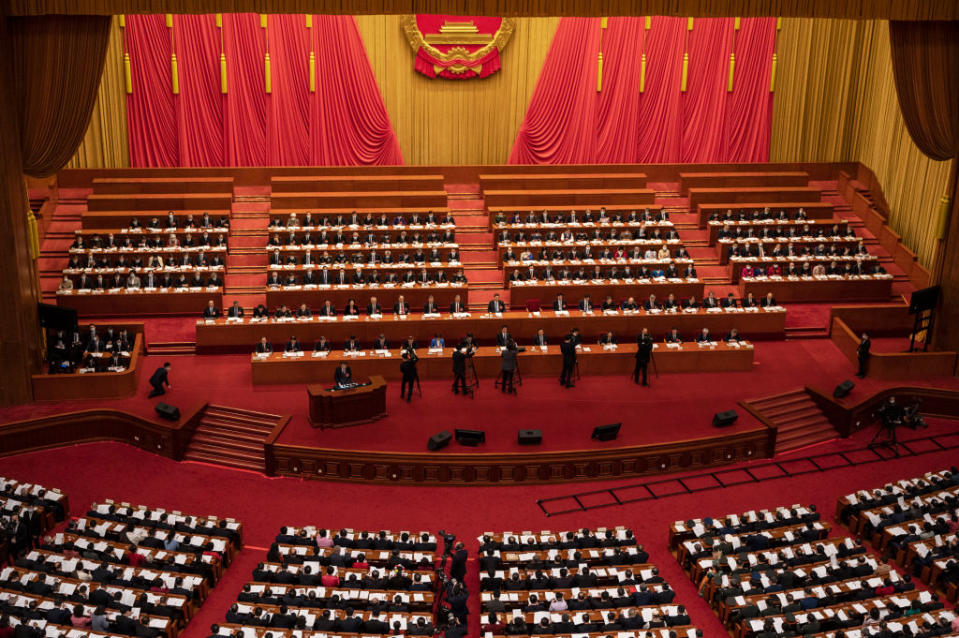Where is China’s blockchain, digital economy headed? The upcoming “Two Sessions” may provide some hints

China’s “Two Sessions” meetings start on Saturday for the most important annual policy gatherings where the authorities are expected to lay out the country’s economic plans for the coming year and reshuffle key jobs.
Initiatives to build a digital economy are expected to be high on the agenda.
The National People’s Congress (NPC), the country’s parliament, meets on Sunday, while the National Committee of the Chinese People’s Political Consultative Conference (CPPCC), the country’s top advisory body, takes place a day earlier. The meetings will last approx. two weeks.
Here are some of the digital trends you should look out for.
Big plans
On Monday, China rolled out a grand digitization plan that emphasizes building out a digital-based infrastructure for the economy by 2025.
According to the plan, China aims to integrate the technology into the real economy, including “the application of digital technology in the agricultural, manufacturing, financial, education, medical services, transportation and energy sectors.” It also calls for “widely accessible digital public services”.
The plan was released after Chinese President Xi Jinping wrote in a January article that technologies such as blockchain, artificial intelligence, 5G and cloud computing will be major drivers of the nation’s new economy and to face international competition.
Threaded through this narrative is a call to “self-confidence”. Iris Pang, chief economist at the think tank ING Economics, wrote in a report on Tuesday that “confidence in advanced technology” is a key theme in meetings with top managers.
“We believe that there will be government funding for both public and private research bodies to engage in R&D (research and development), with the ultimate goal of achieving self-reliance in advanced technology,” Pang wrote.
John Hemmings, senior director at the US research institute Pacific Forum, said in a press briefing in Washington DC earlier this week that Xi’s digital China initiative has big ambitions.
“It is a digital strategy that drives all efforts in China. This is not just an industrial strategy. It is not just a strategy for the technology sector, he said.
“This covers all areas: political, economic, military, even foreign policy, and China’s place in the world,” said Hemmings, who published a research paper titled “Digital China: The Strategy and Its Geopolitical Implications” with another researcher in February .
Blockchain, metaverse
Despite the ban on crypto transactions, China considers blockchain technology key to its digital infrastructure, with a growing number of Chinese local governments showing interest in Web3 development.
At least a dozen Chinese cities and provinces have issued plans or policies to boost the growth of Web3 and metaverse industries, including Shanghai, the country’s financial center.
Shanghai released a policy document last July to build out metaverse-related industries worth around $52 billion by the end of 2025.
The country also unveiled in February that it is establishing a national research center for blockchain technology in the capital Beijing, which has already incorporated blockchain use into its governance by building a blockchain-based data directory for over 80 city departments.
Pi Jianlong, a Beijing-based lawyer and a CPPCC member, told local media this week that there are new types of virtual properties in China that do not fall under the category of financial properties, and that there is an urgent need to regulate such assets. .
Pi said he plans to submit a proposal in the two sessions aimed at speeding up legislation to protect virtual property.
Such virtual properties are often linked to real-world assets, such as wine, tea or artwork, and are powered by blockchain technology and smart contracts, according to Pi.
Pi added that the country should create institutions dedicated to virtual property custody and verification, as the world’s second-largest economy seeks to increase its international competence in a Web3 world, or the development of a decentralized Internet running on blockchain technology.
Hong Kong Legislative Council and CPPCC member Johnny Ng said last month in an interview with Chinese state media that he is interested in discussing metaverse and Web3 during the two sessions.
Ng added that Hong Kong is well positioned to become a Web3 industry hub after the city released relevant policy documents last year.
Lily King, CEO of Singapore-based crypto custody platform Cobo, wrote in a February commentary for Discard: “The Chinese government seems to be trying to replicate what they did with the Internet industry in the Web2 era: to construct an ecosystem independent of the public blockchains of the global market – a Web3 with Chinese characteristics.”
King added that the Chinese government is looking at blockchain technology and digital assets as potential sources of economic growth.
“But all the turmoil and scandals in the global crypto industry over the past year probably only validated its perception of cryptocurrency as a threat to financial and social stability.”
GDP target
Last year, Chinese economic planners set a three-decade low gross domestic product (GDP) growth target of 5.5% for 2022, according to the government’s work report for last year.
Academics at the Chinese Academy of Social Sciences, a key research institute, predicted last month that China’s GDP growth could come in at just 5% by 2023.
Pang of ING Economics wrote that the market is predicting a growth target of 5.5% to 6% GDP coming out of the two sessions, but “this will not be easy for the government to achieve even if China is gradually recovering. “
“We expect GDP growth for this year to be 5%, moving up to 5.5% if consumption and the labor market are very strong,” Pang added.
See related article: How Web3 in China is taking shape – with “Chinese characteristics”


